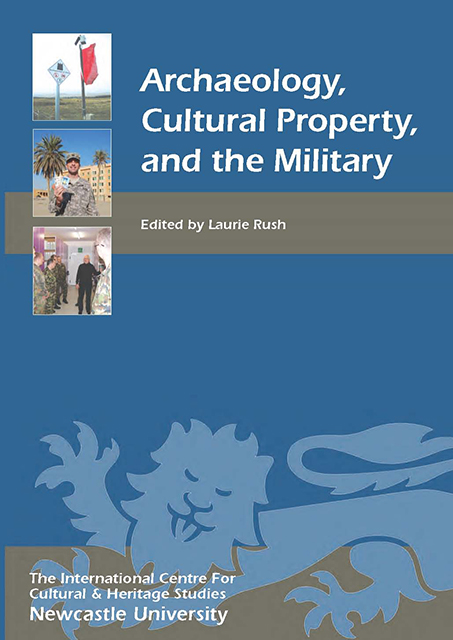Book contents
- Frontmatter
- Contents
- List of Illustrations: Figures and Tables
- Archaeology and the Military: An Introduction
- 1 The Obligations Contained in International Treaties of Armed Forces to Protect Cultural Heritage in Times of Armed Conflict
- 2 Rescuing Europe’s Cultural Heritage: The Role of the Allied Monuments Officers in World War II
- 3 The UK’s Training and Awareness Programme
- 4 US Army Civil Affairs: Protecting Cultural Property, Past and Future
- 5 Cultural Property Protection in the Event of Armed Conflict: Deploying Military Experts or Can White Men Sing the Blues?
- 6 Good Training and Good Practice: Protection of the Cultural Heritage on the UK Defence Training Estate
- 7 In-Theatre Soldier Training through Cultural Heritage Playing Cards: A US Department of Defense Example
- 8 Dealing the Heritage Hand: Establishing a United States Department of Defense Cultural Property Protection Program for Global Operations
- 9 Teaching Cultural Property Protection in the Middle East: The Central Command Historical/Cultural Advisory Group and International Efforts
- 10 Cultural Resources Data for Heritage Protection in Contingency Operations
- 11 Time not on my Side: Cultural Resource Management in Kirkuk, Iraq
- 12 US Military Support of Cultural Heritage Awareness and Preservation in Post-Conflict Iraq
- 13 Operation Heritage
- 14 Cultural Property Protection in the Event of Armed Conflict – Austrian Experiences
- 15 The Role of the Swiss Armed Forces in the Protection of Cultural Property
- 16 Preserving Global Heritage from Space in Times of War
- Appendix 1 1954 Hague Convention and its two Protocols
- Appendix 2 Author Biographies
- Index
3 - The UK’s Training and Awareness Programme
Published online by Cambridge University Press: 28 February 2023
- Frontmatter
- Contents
- List of Illustrations: Figures and Tables
- Archaeology and the Military: An Introduction
- 1 The Obligations Contained in International Treaties of Armed Forces to Protect Cultural Heritage in Times of Armed Conflict
- 2 Rescuing Europe’s Cultural Heritage: The Role of the Allied Monuments Officers in World War II
- 3 The UK’s Training and Awareness Programme
- 4 US Army Civil Affairs: Protecting Cultural Property, Past and Future
- 5 Cultural Property Protection in the Event of Armed Conflict: Deploying Military Experts or Can White Men Sing the Blues?
- 6 Good Training and Good Practice: Protection of the Cultural Heritage on the UK Defence Training Estate
- 7 In-Theatre Soldier Training through Cultural Heritage Playing Cards: A US Department of Defense Example
- 8 Dealing the Heritage Hand: Establishing a United States Department of Defense Cultural Property Protection Program for Global Operations
- 9 Teaching Cultural Property Protection in the Middle East: The Central Command Historical/Cultural Advisory Group and International Efforts
- 10 Cultural Resources Data for Heritage Protection in Contingency Operations
- 11 Time not on my Side: Cultural Resource Management in Kirkuk, Iraq
- 12 US Military Support of Cultural Heritage Awareness and Preservation in Post-Conflict Iraq
- 13 Operation Heritage
- 14 Cultural Property Protection in the Event of Armed Conflict – Austrian Experiences
- 15 The Role of the Swiss Armed Forces in the Protection of Cultural Property
- 16 Preserving Global Heritage from Space in Times of War
- Appendix 1 1954 Hague Convention and its two Protocols
- Appendix 2 Author Biographies
- Index
Summary
It is ironic that the USA and the UK, who have led many of the military interventions of the last decade, have had the least capacity for the protection of cultural property in countries for which they would become responsible. They have lagged far behind The Netherlands, Italy and Austria, all of whom developed specialist units and military staffs for this work. While the USA and UK might have been able to rely on their NATO allies for some expertise in Cold War operations in Europe, they have not been able to do so on expeditionary operations elsewhere when these countries were not deployed. Even more critically, these countries, with their capabilities, were not involved in the planning of the operations when the input could have been the most constructive and would have helped to avoid many of the later calamities.
There are several reasons for this extraordinary omission. One was the incompatibility of a nuclear power signing up to protect cultural property if there was any use of such weapons. Another was a mistaken belief by the US military that war fighting was an end in itself and peace-making was not their task, and a reluctance to take on more responsibility than they could easily fulfil. The long tradition in the Anglo-Saxon countries of emphasising the private ownership of and freedom to trade in cultural assets has led, in government and in the national psyche, to the involvement of the State assuming a weak position in cultural matters: hence the absence of a Ministry of Culture in the USA and the rather weak and comparatively recent culture Ministry (currently known as the Department for Culture Media and Sport) in the UK. There has therefore been no focus in the government for these concerns.
There was some suspicion that the USA and UK Governments were lobbied by the strong art trades in both countries, who did not want any restrictions on their activity which might have resulted from either country ratifying the 1954 Hague Convention on the Protection of Cultural Property in the Event of Armed Conflict. These groups had certainly pressurised the State Department, the Foreign Office and the Attorney Generals in both the USA and UK not to recognise the laws of those countries trying to stop exports of cultural property.
- Type
- Chapter
- Information
- Archaeology, Cultural Property, and the Military , pp. 28 - 33Publisher: Boydell & BrewerPrint publication year: 2010
- 1
- Cited by

